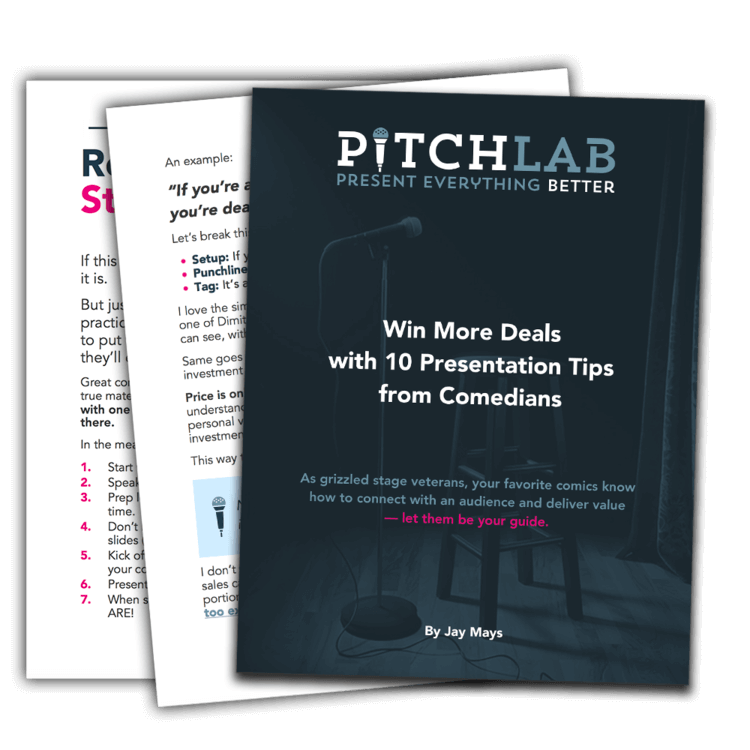Making Science a Riot with Steve Nash!
/What could possibly be funny about tree-ring dating or Russian gem carvings?
Lots, if you hear about them from Steve Nash. As Director of Anthropology and Curator of Archaeology at the Denver Museum of Nature & Science (whew!), this author and Getty Leadership Institute graduate has a list of accomplishments longer than a Diplodocus tail.
Steve mingles his scientific know-how into his stand-up comedy. He also serves on the board of Science Riot, a non-profit that teaches scientists to be better speakers by using stand-up comedy techniques in their presentations.
Pitch Lab caught up with Steve to ask him a few questions about his worst experience on stage, what’s so funny about ancient Pompeii and why every scholar needs to work on their public speaking skills:
How do you describe what you do for a living to your kids?
I study humanity in all its absurd, ridiculous glory. I’m therefore a kid in a candy store.
What are you most proud of in your career thus far?
Having worked at two fantastic museums, having traveled widely, and having a productive working relationship with Russian colleagues during a time of geopolitical tension. Art and Science above Politics.
Dinosaurs or UFOs?
UFOs, for they tell us a lot more about our own insecurities then they do about extraterrestrial life.
If you could invite three people to dinner—living, dead, fictional, or real—who would they be?
Leonardo da Vinci. The embodiment of genius and expansive curiosity, coupled with a horrible business acumen and a remarkable inability to complete important projects. A HUMAN genius to be sure.
Curly Howard of The Three Stooges. A comedic genius, with demonstrable grace and athleticism, who also has an impeccable sense of timing—all the while commenting on social inequality in the 1930s and 1940s. Who could ask for more?
A Neanderthal woman. Neanderthal men get all the focus and perhaps credit when we think of “cavemen.” What was it like to be alive 40,000 years ago, and to be a Neanderthal? Surely, a woman would have more insights…
If you could travel to any time period (backward or forward) where would you go?
Renaissance Italy. From a health and safety perspective, it would have been a horrible place to live. But from an enlightenment perspective, what a time! Throw off the shackles imposed by the Catholic Church to embrace Humanism and the belief that life here on earth is worth living AND enjoying. Thrilling!
What’s your all-time favorite exhibit at the Denver Museum of Nature & Science?
The “A Day in Pompeii” traveling exhibition in 2012. A tragically precise moment recorded archaeologically.
I was so intrigued by this time period I wrote an entire comedy set on the subject.
Who is the comedian you admire most and why?
Dave Chappelle. A brilliant comedian who infuses his jokes with keen and often biting commentary on social justice issues. Confidence personified.
You’ve called stand-up comedy the hardest things you’ve ever done professionally. Why is that?
It went against EVERYTHING I was formally trained to do. The structure of the routine was different. The cadence was different. The expectation was different.
What is the best piece of comedy advice you’ve received?
Stop and pause. Recognize where the audience is during your routine, then work with that flow. Acknowledge interruptions and jokes that don’t do so well. It’s a dialogue, not a soliloquy.
How has stand-up comedy helped you in your career?
It’s diversified the experiences and opportunities I am involved in and with. I meet a totally different crowd of professionals who are smart and insightful, and I get to share laughs with them.
What’s the worst stage fright you’ve ever had before a presentation, and how did you get through it?
First: Giving a presentation on acid-base titration in high school chemistry, in a suit. I didn’t get through it. I bombed horribly.
Second: Doing my first stand-up comedy routine at Science Riot at the Denver Museum of Nature & Science in 2016. I memorized the routine so well that I did it with muscle memory, plowed through it, then took a deep, deep breath at the end. It was addictive!
The first time you saw Pitch Lab were you surprised how well stand-up comedy techniques translated to public speaking and presentation skills?
Yes! They’re not necessarily easy techniques, but they’re simple and actionable once you understand them.
Why should every museum professional and scholar stop what they’re doing and attend a Pitch Lab workshop right now?
Because scholarly presentations are a kind of performance, and all performances can be improved with practice and awareness. I am tired of horrible presentations and, quite frankly, can’t understand why scholars are so willing to spend so much time and effort on the content without spending even a minimum amount of time focused on the delivery. It works!
While Steve stays crazy busy in his professional life, if he ever expands into giving museum tours, you know the guide you’ll want to choose.
Ladies and gentlemen, a big round of applause to Steve Nash for helping the world of science find its funny!






